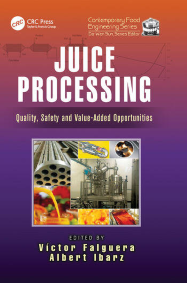Juice Processing Quality Safety and Value added Opportunities
Material type: TextLanguage: English Series: Contemporary Food EngineeringPublication details: Boca Raton, FL : CRC Press, 2016Description: XIX, 381 p. : illISBN:
TextLanguage: English Series: Contemporary Food EngineeringPublication details: Boca Raton, FL : CRC Press, 2016Description: XIX, 381 p. : illISBN: - 9781138033740
- 663.63 FAL
| Item type | Current library | Shelving location | Call number | Copy number | Status | Date due | Barcode |
|---|---|---|---|---|---|---|---|
 Reference Collection
Reference Collection
|
Reference Section | Department of Food Engineering | 663.63 FAL | 2022-23 | Available | 97924 |
Biography
Víctor Falguera received two PhDs, one of them in agrifood science and technology at the University of Lleida and the other one in engineering and advanced technologies at the University of Barcelona. He worked for several years in the Food Technology Department of the University of Lleida in topics related to fruit juice processing, such as non-thermal technologies, fruit-derived enzymes, and fluid food physical and chemical properties analysis. Having published more than 50 scientific papers, Dr. Falguera is one of the founding members of the platform Agricultural Knowledge and Innovation Services (AKIS International).
Albert Ibarz received a PhD in chemical engineering from the University of Barcelona. He is a technical engineer in the agricultural and food industries for the Polytechnic University of Catalonia. Dr. Ibarz is a professor of food technology at the University of Lleida. He has published more than 200 scientific articles, mostly on rheology, chemistry, biochemistry and photochemistry kinetics, and UV treatments. He has presented more than 150 communications to national and international congresses. Dr. Ibarz is coauthor of three food engineering books and author and coauthor of eight book chapters.
SUMMARY:
The ability to provide quality juices that contain proper vitamins and nutritional components strongly depends on the processes fruits undergo during the various stages of industrial manufacturing. New technologies have been developed to help ensure the production of quality juices without neglecting safety. Covering both new approaches to traditional issues and innovative processes, Juice Processing: Quality, Safety and Value-Added Opportunities addresses various aspects of fruit juice processing and other issues related to the use of by-products generated in this industry.
The book begins with a chapter highlighting the importance of the fruit juice sector and describing the general process of fruit juice manufacturing. The text explores current trends in juice production, reviews the main superfruits, and discusses methods for using juice waste by-products, presenting citrus and grape juice as examples. The book covers assessing juice quality and authenticity, and how to evaluate fruit properties using the principles of rheology as well as examining sensory attributes. It also examines alternative techniques for improving fruit juice quality, including both thermal and nonthermal emerging technologies, their fundamentals, and their main effects on important features of fruit juices.
Emphasizing product quality, safety, and nutrition, the chapter on juice packaging summarizes the materials, techniques, and technologies currently used as well as novel packaging for increasing shelf life and decreasing environmental impact. The authors address issues concerning spoiling microorganisms and biological and chemical hazards. They also examine public and private standards and regulations, which need to be reworked to keep up with today’s food-related concerns.
